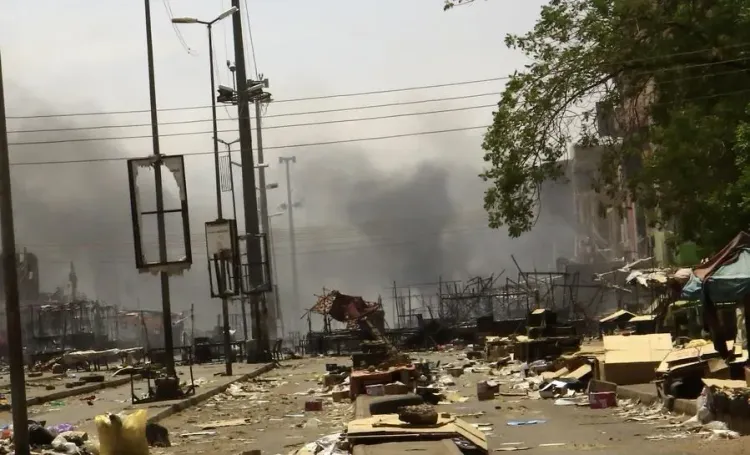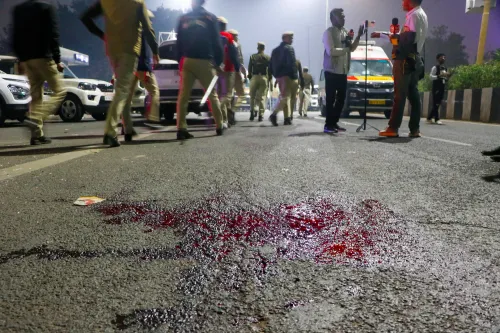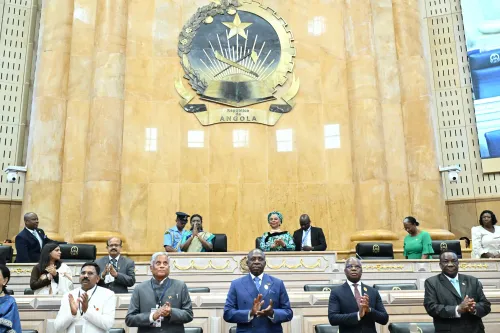Are Sudan's Museums and Archaeological Sites Facing Total Destruction Due to Civil War?

Synopsis
Key Takeaways
- Sudan's museums and archaeological sites are under threat due to the ongoing civil war.
- Over 70% of artifacts from the Sudan National Museum have been lost.
- Key museums, including the Military Museum, have suffered significant looting and destruction.
- The government is collaborating with UNESCO to recover stolen artifacts.
- Armed clashes are directly threatening important archaeological sites like Naqa.
Khartoum, May 19 (NationPress) As the world marked International Museum Day, officials and experts highlighted that Sudan's museums and archaeological sites have endured extensive looting and devastation stemming from the ongoing civil conflict. "Sudan is perilously close to erasing its history, as museums and cultural treasures have been systematically pillaged and antiquities unlawfully trafficked," stated Ghalia Jar Al-Nabi, the director of Sudan's National Corporation for Antiquities and Museums, in an interview with Xinhua.
She disclosed that approximately 70 percent of the artifacts from the Sudan National Museum, which housed over 100,000 pieces covering all historical eras since the Stone Age, have vanished, including gold and jewelry belonging to the kings and queens of Napata, the capital of the ancient Kingdom of Kush from around 750 to 590 BC, in what is now modern-day Sudan.
Al-Nabi noted that seven government-operated museums have been looted and destroyed, three of them located in the capital Khartoum, including the Sudan National Museum, the Khalifa House Museum, and the Ethnographic Museum, along with three in the Darfur region and one in Gezira State.
"These museums held vast collections of rare artifacts representing every phase of Sudan’s history," she added, emphasizing that she has seen images of smuggled artifacts listed for sale on eBay after being transported out of the country via trucks.
Beyond government institutions, several specialized museums, including the Military Museum in Khartoum, have also been targeted for destruction, looting, and theft, according to Omar Al-Nour, director of the General Administration of Exhibitions and Military History and the Military Museum.
"This museum represented the cultural memory of the military institution and included significant military artifacts, vintage aircraft, tanks, and weapons," he explained.
As early as September 2024, the United Nations Educational, Scientific and Cultural Organisation (UNESCO) warned that the looting of museums, archaeological sites, and artifacts posed a severe threat to Sudan's cultural heritage.
Recently, the Sudanese government announced it has requested assistance from UNESCO and the International Criminal Police Organisation to recover stolen artifacts and has formed an international team of archaeologists to locate the looted items, Sudan's Minister of Information and government spokesperson, Khalid Ali Aleisir, disclosed in a recent interview with Xinhua.
"We have developed a robust plan and measures, in collaboration with UNESCO, to monitor and reclaim the looted artifacts," he stated.
Furthermore, Sudan’s archaeological cities have not been spared from the war. Some have experienced direct armed clashes, while others have faced the broader consequences of the conflict.
The ancient city of Naqa, located in the River Nile State in northern Sudan, has become a battlefield between the Sudanese Armed Forces (SAF) and the paramilitary Rapid Support Forces (RSF), who have infiltrated the archaeological site.
"The archaeological site of Naqa is considered one of the most significant historical sites in Sudan and is recognized as a World Heritage Site," remarked Abdalla Abdul-Khaliq, a researcher in Sudanese heritage.
"This site is home to statues, ruins, and shrines from the Meroitic era (approximately 300 BC – 400 AD). Although there are no official statistics on the damage, armed clashes in such a sensitive archaeological area undoubtedly pose a direct threat," he added.
While the ancient city of Suakin in eastern Sudan has not been directly impacted by the war, restoration efforts on its historic structures, led by the Turkish Cooperation and Coordination Agency, have come to a halt as the government prioritizes urgent wartime needs.
"The restoration of Suakin's heritage buildings was anticipated to be completed earlier, but the war has delayed progress," stated Ibrahim Shungarai, a member of Suakin's native administration and a tour guide in the ancient city, as reported by the Xinhua news agency.
Located on Sudan's Red Sea coast, about 780 kilometers from Khartoum, Suakin features numerous historical landmarks, including the El-Shenawy Palace, a monumental structure made of coral stone, clay, and sea sand, with more than 360 rooms, as well as the Customs Building, the Hanafi and Shafi Mosques.
Sudan has been engulfed in a catastrophic conflict between the SAF and the RSF since mid-April 2023, which has resulted in tens of thousands of casualties and displaced millions of individuals both within and outside the country.









